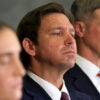America is a golden land of opportunity. Yet many of the country’s young people don’t see it that way. They believe the American dream is unattainable and that America is a racist and bigoted place full of evil oppressors.
Ian Rowe, a senior fellow at the American Enterprise Institute and author of the new book “Agency,” wants to change that narrative and prove to America’s youth that there is something worth striving for.
“I want young people to know that they can do hard things,” Rowe explains. “That they live in a good, if not great, country. That, with the right ingredients, they can lead a life of their own choosing.”
Rowe thinks there’s two factors responsible for American youth: a “blame the system” narrative and a “blame the victim” narrative.
“In the ‘blame the system’ narrative, if you are not achieving the American dream, the reason is America itself. That America itself is this oppressive nation. That based on superficial characteristics like gender or race, you’re oppressed,” says Rowe.
The other philosophy blames the individual themselves.
“It’s your fault. It’s some pathology that you have. You didn’t pull yourself up by your own bootstraps,” says Rowe. “But if a young person hasn’t had the right kind of nurturing from a strong family, strong faith-based organization, strong educational opportunity, then it’s very difficult for them independently to overcome these hurdles.”
Rowe joins the show to discuss his new book and how we can inspire young people to succeed.
We also cover these stories:
- President Joe Biden threatens to use emergency powers if oil companies don’t boost supplies amidst growing gas prices.
- Mayra Flores wins a special election in Texas, marking the first time a Republican will represent the Rio Grande Valley since 1871.
- George Washington University retires its century-old Colonials moniker over outcry from student activists.
Listen to the podcast or read the lightly edited transcript below.
Richard Reinsch: Hello, I’m Richard Reinsch. I’m at the 2022 Heritage Resource Bank conference in Nashville, Tennessee. Today I’m going to interview Ian Rowe, one of our featured speakers at the conference. He’s a senior fellow at the American Enterprise Institute. Before that he was the CEO of Public Prep, a nonprofit group of charter schools in the South Bronx and the Lower East Side of Manhattan.
Ian Rowe, we’re glad to interview you today.
Ian Rowe: Good morning, Richard. How are you?
Reinsch: Great, wonderful. Ian, you have just written a book entitled “Agency.” What’s that book about? What are you trying to communicate in it?
Rowe: Well, thank you very much for having me on. As you mentioned, for the last decade I ran a network of public charter schools in the heart of the South Bronx and the Lower East Side of Manhattan. And I’m now launching a new International Baccalaureate high school also in the Bronx.
And the reason I run schools is, I want young people to know that they can do hard things. That they live in a good, if not great, country. That, with the right ingredients, they can lead a life of their own choosing.
And unfortunately, over the last decade and really accelerated over the last few years, I’ve really gotten a sense that young people are immersed in a very defeatist narrative. A narrative around victimhood, about all the things that they can’t do in this country. So I’ve written “Agency” as what I hope to be an empowering alternative to these metanarratives, which I can describe.
Reinsch: Excellent. So agency being, you are trying to remind them that they have free will. Agency, that they have the ability to make choices, virtuous choices, that will lead to human flourishing.
In your career experience, what are the biggest barriers? I mean, you’ve mentioned a narrative. You’ve mentioned accepting that perhaps I should fail, or that everyone is against me. What are the biggest barriers to income social mobility in America?
Rowe: Well, like with most things, the No. 1 factor, the sort of foundation of society, is the strength of the American family. And a lot of my work continues to tie back to timing of family formation is one of the most critical decisions that young people can make.
But let me just step back for a second and describe what I do think young people are sort of wallowing right now. And there’s what I call this “blame the system” narrative and also a “blame the victim” narrative.
In the “blame the system” narrative, if you are not achieving the American dream, the reason is America itself. That America itself is this oppressive nation. That based on superficial characteristics like gender or race, you’re oppressed. There’s a white supremacist lurking on every corner. Capitalism itself is evil. And these systems are so rigged against you that you as an individual are essentially powerless, unless there’s a massive government intervention or some other massive social transformation.
So obviously, that’s a very debilitating message if you are a young person and you’re hearing that. But on the other side there’s what I call “blame the victim.” In that conception, if you’re not successful in this great country, it’s your fault. It’s some pathology that you have. You didn’t pull yourself up by your own bootstraps.
Completely ignoring the fact that, young people, there’s always an element of personal responsibility. But if a young person hasn’t had the right kind of nurturing from a strong family, strong faith-based organization, strong educational opportunity, then it’s very difficult for them independently to overcome these hurdles.
So these two metanarratives of “blame the system” and “blame the victim,” in my view, add up to a singular lie that’s robbing young people of agency. And I put forward the framework called FREE—family, religion, education, and entrepreneurship—that I think are the four pillars that most reliably predict whether or not a young person will be able to lead a life of flourishing.
Reinsch: Thinking about your education efforts and the students that you’re trying to educate, there’s a lot of dismal data, as you’re aware of. Americans in the bottom half of the income scale in terms of assets, ownership, income, flat incomes. Also, there’s a family dimension there as well in many cases.
What are, as we think about these barriers here as well for those in the bottom half of the income system, do you see this as primarily structural? Or is there something else involved and that’s this sort of personal responsibility element, but also an element of, you can be asked to do more and you could respond and do more? How should we think about the challenges facing people on the lower end of income?
Rowe: Well, you’re asking about income, and there’s a lot of attention often focused on something called the racial wealth gap.
And people use that because if you look at the data based on the 2019 Survey of Consumer Finances, if you look solely at race, the median wealth of the average white family is about $160,000 more than the median wealth of the average black family.
And so people say, “See, that’s the proof of both historical discrimination and contemporary discrimination. And there’s nothing that black people can do to overcome that hurdle.”
Well, if you actually look at the same data in the 2019 Survey of Consumer Finances, you find if you take into account just two factors, the whole financial situation is exactly flipped. The median wealth of the average black married, college-educated family is about $160,000 more than the median wealth of the average white, single-parent family.
So what that indicates is that there are factors beyond just race that determine whether or not you can be economically successful, as well as successful in every other aspect of life.
So that’s why it’s so important that young people learn about information, like what’s called the success sequence. If you’ve ever heard that data, basically, if you finish just your high school degree, get a full-time job of any kind just so you learn the dignity and discipline of work, and if you have children, marriage first, 97% of millennials who follow that pathway of decision-making avoid poverty. And the vast majority enter the middle class.
Those are decisions that young people do have in their control. And the reason I’ve written “Agency” is to help young people know that there are behaviors that they can say yes to, as opposed to always listening to a debilitating narrative about everything they can’t do.
Reinsch: These entrepreneurial schools that you’ve been involved with and continue to be involved with, how do students respond to this message? I mean, in many ways it sounds like you are going back to an earlier tradition in American public education of also trying to emphasize the soul. That the soul and knowledge itself working together to produce a whole rounded person.
Rowe: Yeah. The new high school that we’re launching is organized around the four cardinal virtues of courage, justice, wisdom, and temperance.
And the reason we’ve chosen these four cardinal virtues is that, obviously, it’s important that kids learn about math and reading and writing and science, but there is an aspect of the human dimension, that there are ways of being, that there’s a moral structure that will help shape your life.
I, in fact, define agency as the force of your free will guided by moral discernment. The force of your free will guided by moral discernment. So the question is, if each one of us has agency, has free will, where does the ability to learn what is right or what is wrong? So think of agency like a vector or velocity. Velocity’s not just speed, it’s speed and direction.
So the reason I’ve created FREE as a framework, family, religion, education, entrepreneurship, those are the pillars that can help young people, if they embrace them, understand with a strong family that that means certain responsibilities for how you lead your life.
Religion, a personal faith commitment, gives you a certain moral code to live by. Education, especially education driven by school choice, means that you get to go to a school of your choosing, best designed for your interests. And then entrepreneurship is all about work and how you build wealth for not only your family, but the next generation.
And so, yes, these are elements that I think are very important that young people learn that’s also in their sphere of control.
Reinsch: Listening to you talk about the school system, it sounds wonderful. What are the barriers you face in building it and expanding it and offering it to increasing numbers of students and families?
Rowe: Yeah. This is one of the challenges. In the district in which I lead schools, District 8 in the South Bronx, of the 2,000 students that started ninth grade in the year 2015, four years later, only 2% graduated from high school ready for college. Meaning that they started ninth grade and dropped out along the way, or they actually did earn their high school diploma but still could not do reading nor math without remediation if they were to go to college.
So I don’t know which is worse, you drop out or you actually do what you’re supposed to do and you still can’t compete with everyone else going to college, or compete at a college standard.
And yet in this district, there’s a cap on the number of charter schools that can be open. So if you had a great idea to create a great school for these kids, you couldn’t do it. That’s an example of a real barrier, a real systemic barrier.
So there is some validity to this idea of there being systemic challenges, that being one of them for school choice. And though a young person still, once you’re given that opportunity, you have to know, what are the ways of being? What are the decisions that I have in my control that will allow me to lead the life of my own choosing?
Reinsch: Sounds to me like the systemic challenge is government. Government getting in the way of entrepreneurial education efforts like yours. Governments, as I read, trying to put regulations back on charter schools that make them face the same hurdles the regular school system faces. The students that try to enter your school, are they subject to this charter lottery system that so much has been said, written about, portrayed in New York?
Rowe: Oh, yeah. I mean, right now for the schools that I led for 10 years, there were about 2,000 students in our schools, kindergarten through eighth grade, but we had nearly 5,000 kids on the wait list every single year. And these are families desperate for their kids to have a shot at the American dream.
But solely because of a government regulation, there isn’t choice, which, by the way, exists for virtually every middle- and upper-class family in the country that has the ability to send their child to a private school or move to the suburbs or just have choice. And yet the very vulnerable kids all across the country, from Appalachia to Chicago to New York City, the first rung of getting on the pathway to prosperity is having—well, one is having a strong family and two, having access to a great school. So that is a real impediment.
Reinsch: Thinking about this effort that you’re launching here, many people listening, wondering, how could I do something? Do you need support from other people outside? I mean, I think a lot of our listeners would appreciate that opportunity. How could they help you?
Rowe: … First of all, we would certainly love the support. Every charter school, from a financial perspective, has to raise money in its initial year. So Vertex Partnership Academies is raising capital right now.
But really, the idea is that we raise philanthropy only for a short period of time to then be able to actually flourish on public dollars. To demonstrate that we can get phenomenal results with kids, in the same neighborhoods, in the same buildings, where other kids are being failed by the traditional system.
So we want to be able to prove that even working, and sometimes even less than what the government provides to traditional district schools, we can have a flourishing great school for our kids.
But in terms of how people can help, I often say, start within your own community. Look at the opportunities that either exist or don’t exist for the kids in your schools. Run for school board. I ran for school board in my own hometown because I wasn’t satisfied with what I was seeing in terms of the offerings for our school district.
And I think across the country, you’re seeing parents who are saying, “You know what?” After COVID, after seeing attempts of potentially indoctrination and other things happening in schools, parents are saying, “You know what? I want to help elsewhere, but let me start with my own hometown first.”
Reinsch: So, thinking about American conservatism, which has obviously supported for a number of decades all manners of entrepreneurial efforts to increase choice in education, what’s the next frontier or next strategic move that should be made to sort of deepen and continue the efforts that you’re involved in and many others?
Rowe: Well, I hope that the cat is out of the bag in terms of parental involvement and power and recognition. Whether it be the Virginia governor’s race or lots of initiatives across the country where school boards are being replaced because, A, they didn’t have schools open during COVID, or suddenly they’re teaching content which is questioning the very basic ideas of man and woman, that is portraying race as being the dominant factor in a young person’s life. Very debilitating narrative.
So I hope the next big step is that parents, not only during election time, although I think that is obviously an important time in terms of changing our leadership, but more parents recognizing that they don’t have to be satisfied with substandard performance of their schools. And they have power. Whether it be running their own school boards or organizing themselves, or frankly, exiting the traditional K-12 system, homeschooling or entering private religious schools. I think that’s a very good thing for our country.
Reinsch: Ian Rowe, thank you so much for joining us with “The Daily Signal Podcast.” We appreciate your efforts.
Rowe: Thank you very much.
Have an opinion about this article? To sound off, please email [email protected] and we’ll consider publishing your edited remarks in our regular “We Hear You” feature. Remember to include the url or headline of the article plus your name and town and/or state.





























